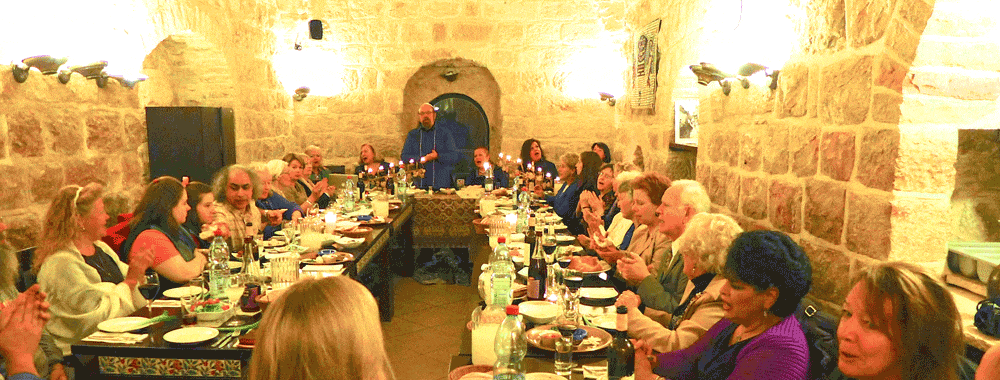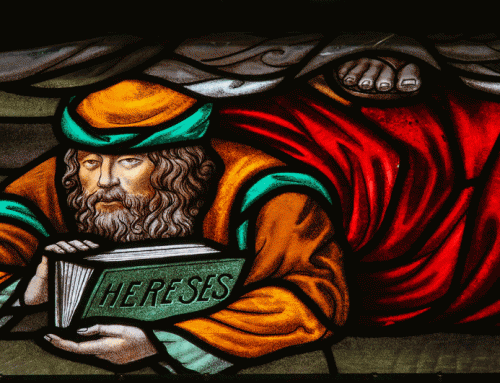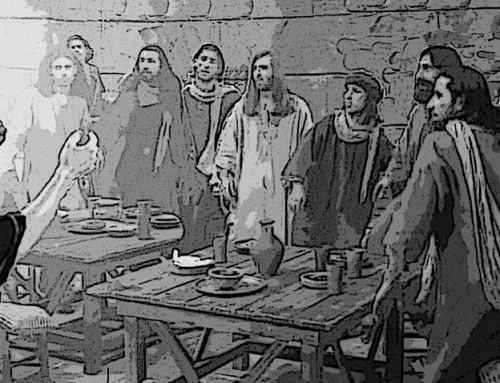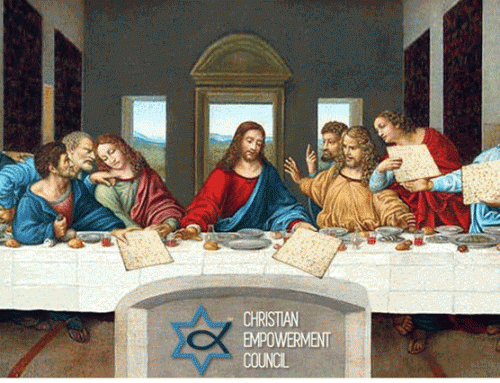When John the Baptist exclaimed, “Behold, the Lamb of God!,” he understood, as a son of a priest of the Temple, that there were sacrifices for sin. These animal sacrifices went back to the Law of Moses and were prefigured in Abraham offering up Isaac. During the Egyptian Exodus, to be saved from the Death Angel, the Israelites had to eat the Passover lamb and daub its blood as a sign on their doorposts.
Now fast forward to the Last Supper of Yeshua, the Passover meal. At the meal he was THE lamb of God.
Yeshua said longingly, “With great desire I have desired to eat this passover with you.”
Just as Christians enjoy a Christmas banquet, Americans love a Thanksgiving meal, Muslims and Hindus revel in their feasts, the Jews enjoy the food and family fellowship of a Passover seder. (Seder means “order,” because there is a liturgy with the meal commemorating Israel’s deliverance from Egyptian slavery.)
Although he was falsely accused of being a glutton and drunkard for dining with sinners, Jesus was not a man normally given to appetite. Yet the record says, expressing intense desire, Yeshua especially desired and looked forward to eating this particular Passover meal.
There are four accounts of the institution of the Lord’s Supper found in Matthew 26, Mark 14, Luke 22 and 1 Corinthians 11.
“And he said unto them, With desire I have desired to eat this passover with you before I suffer: for I say unto you, I shall not eat this meal again, until it is fulfilled in the kingdom of God.” (Luke 22:15-16)
“With desire I have desired” is a Hebraism spoken by our Hebrew Lord, meaning, “I have desired most earnestly,” or “I have greatly desired.”
Let’s try to imagine some of the many reasons why Yeshua intensely anticipated this meal:
1. As a child and an adult, for three decades he had enjoyed going up to Jerusalem for this festive meal, as was his family’s custom. So many memories and thoughts were in his mind as he contemplated the deep significance of all that the meal commemorated. Progressively, Yeshua had come to realize that he would be the prophetic fulfillment, even the embodiment of all the Passover elements.
Because he knew as he was about to depart, Yeshua was desirous of the fellowship and solace of being together with his closest disciples, and of partaking with them of one of the privileges of the Jewish heritage. Jesus was human as well as God, and as Israel’s greatest native son, he deeply valued the sabbaths and festivals of the Lord. He also appreciated the blessings of social events. His first miracle was performed at a wedding.
One of the great joys of life is looking forward to a gathering around a table with the people we love. But also very importantly, Yeshua planned to draw physical strength from this meal to be able to endure the physical and emotional ordeal he would face within a few hours.
2. Yeshua had on his mind this opportunity to prepare the apostles for his sufferings, and to impress upon them more fully the certainty that he was soon to be betrayed and crucified, that they might be mentally, emotionally and physically prepared as well for the shock and ordeal.
3. The greatest reason that Yeshua greatly desired to host this Passover seder is that He was prepared to change its script. He intended to institute the Lord’s Supper, a most solemn and awesome event, as the re-writing of the liturgy rehearsed for generations was this: for centuries the Jews had said of the unleavened bread, “this is the bread of affliction.” Now Yeshua would amplify the bread of affliction with its full meaning, “This is my body broken for you.” Even today the unleaven bread called matza is pierced through and striped like the body of Yeshua that was broken and bruised during his scourging and crucifixion, his Passion to make atonement for the sins of mankind.
And of the cup of wine, Yeshua changed the liturgy to say, “This is my blood of the New Covenant,”[the Brit Hadashah in Hebrew, fulfilling Jeremiah 31:31], “which is poured out for many for the forgiveness of sins.” He said he would not drink it again until this seder would be changed and fulfilled into the Marriage Supper of the Lamb. Thus the Passover seder undergoes two glorious changes: the meal commemorating Israel’s Exodus from Egypt was changed to the Lord’s Supper commemorating our exit from sin and ultimately it will be upgraded to the Marriage Supper of the Lamb, when God’s eternal purposes will be victoriously culminated.
At Yeshua’s table in the Upper Room, these changes to the narrative would not be easily digested, spiritually speaking. His words were all so new and radical, yet it was the plan of God from the foundation of the world. All his sufferings were the expression of love to his people and concern for their welfare and redemption.
Clarke’s Commentary on the Bible also explains the dimension of love underscoring the Lord’s thoughts when he said, “With desire I have desired:”
“Our Lord’s meaning seems to be, that, having purposed to redeem a lost world by his blood, he ardently longed for the time in which he was to offer himself up. Such love did the holy Jesus bear to the human race. This eucharistic passover was celebrated once, by way of anticipation, before the bloody sacrifice of the victim of salvation, and before the deliverance it was appointed to commemorate; as the figurative passover had been likewise once celebrated before the going out of Egypt, and the deliverance of God’s chosen people.”
The burden of the Lord upon Yeshua would have been incredibly intense. This was no ordinary Passover seder! This was THE Seder of Seders! Yeshua would orchestrate it bringing out great doctrinal truths, and in the mix, he would also take both the time and energy under immense pressure to teach the squabbling disciples who was the greatest by setting the example: he washed their feet.
And as if all of this were not enough, while instituting the Lord’s Supper, Yeshua would also have to take time to deal with his betrayer: Matthew 26: 21 records, “And as they did eat, he said, Verily I say unto you, that one of you shall betray me” as he offered the best morsel from the table to Judas.
Matthew Henry’s Concise Commentary notes 22:7-18 Christ kept the ordinances of the law, particularly that of the passover, to teach us to observe his gospel institutions.
“According to the orders given them, the disciples got all ready for the passover. Jesus bids this passover welcome. He desired it, though he knew his sufferings would follow, because it was in order to his Father’s glory and man’s redemption. He takes his leave of all passovers, signifying …the passover was never more to take place, …in this ceremonial way, since it would have its accomplishment … fulfilled under the Gospel dispensation, which is often meant by the kingdom of God; in himself, who is the passover sacrificed for us, 1 Corinthians 5:7, for the passover lamb was a type of Christ, and he is the sum and substance of that shadow, and the fulfilling end of that type; it had its accomplishment in him; … a perfect deliverance of the saints from sin, Satan, and the world; which the deliverance of the Israelites out of Egypt was typical of, commemorated in the passover; and therefore then will be sung the song of Moses, and the Lamb; and then will Christ, and his true followers, eat and drink together in his Father’s kingdom, and spend an endless eternity in never fading joys and pleasures.”







Leave A Comment